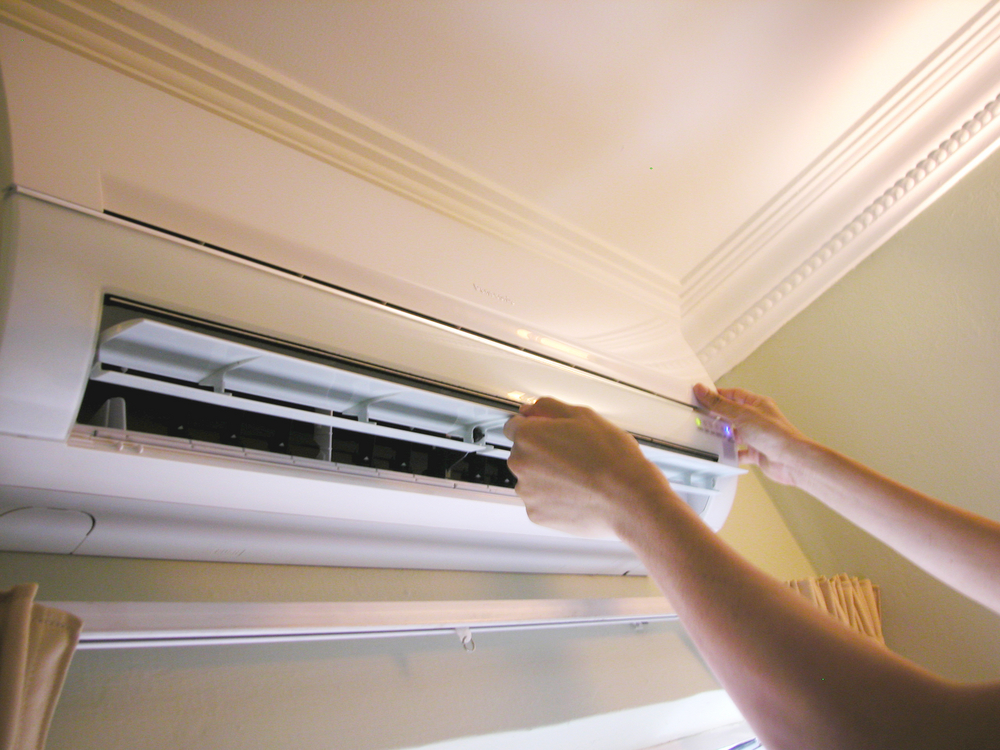Key points:
- Cleaning your air conditioner helps improve its efficiency.
- To clean your air conditioner you will need several tools including a soft brush or vacuum, air conditioner cleaner or a gentle cleaning solution and warm water.
- You can replace or clean your air con filters.
If you’re sweating through summer even with an air conditioner on full blast, you might be scratching your head as to why. While there may be a few causes of this malfunctioning, it is likely due to a build-up of dirt and dust in your air conditioner. If you want to restore your unit to its full capacity, the first thing on your to-do list should be a thorough clean.
For those unfamiliar with the process, we’ve put together a step-by-step guide detailing how to clean your air conditioner. . Note that this guide has been written for split-system air con units, so if you have a ducted, vented, window, or portable air conditioner, your unit’s cleaning needs may vary.
On this page:
- What tools do I need to clean my air conditioner
- How do I clean my air conditioner
- How to clean air con condenser coils
- How to clean the air conditioner filter
- How to clean the indoor unit’s fan coil
- Air conditioner maintenance tips
- How often should you clean your air con?
- Is it worth cleaning my air conditioner?
What tools do I need to clean my air conditioner?
Some items you will need to clean your air conditioner include:
- A dedicated air conditioner cleaner or gentle cleaning solution
- A soft brush or vacuum
- Warm water
- A shady place to put your air con filter out to dry
How do I clean my air conditioner?
Cleaning your air conditioner is not as difficult or technical as it may sound. Areas that you should cover in order to properly clean your air con include the condenser coils, the filter and the fan coil.
Here’s how to clean your air conditioner:
- Turn the power off via your remote or wall plug
- Find where your air conditioner filter is, if you’re unsure check your appliance guide or the manufacturer’s website
- Brush or vacuum excess dirt from the filter
- Remove the filter and wash with warm water and air conditioner cleaner
- Replace the filter if it is single use or if you notice any damage
Air conditioner cleaner
An air conditioner cleaner will help break down dirt, grease and grime in your unit. Cleaners can be purchased at a hardware store, and will generally outline instructions as to how to best use it. Alternatively, you can make your own out of soapy water and baking soda.
How to clean air con condenser coils
Before you begin, it’s crucial that there’s no power running through the system. Turn off any power points your air conditioner is plugged into, and turn it off at the circuit board.
Now that your unit is switched off, you’re ready to clean the condenser coils in the outdoor component of the system. Follow the steps as listed:
- Access the condenser coils by removing the outer casing (this will most likely require a screwdriver).
- Locate the coils and remove any other components obstructing your access.
- Brush off any surface dirt or grime using a stiff brush or duster.
- Remove trapped or caked on dirt by applying a suitable cleaning agent and rinse it away with water (spraying from the inside) after 10 or 15 minutes.
- Check the coil fins. If any appear bent or damaged, comb them straight with a ‘fin comb’ (these can be purchased from most hardware or specialist air conditioning stores).
Note, you can clean the evaporator coils in your indoor unit with a compressed air canister (these can be purchased from most hardware stores).
How to clean the air conditioner filter
You can clean your air conditioner filter by following the below steps:
- Remove or open the front grille on the unit (you should be able to remove one large mesh filter panel or two smaller ones).
- Take the filter panels outside and knock them gently together to dislodge the dust, vacuuming off the remaining grime.
- Wash the filters with warm water and detergent and rinse them clean.
- Ensure the filters are completely dry before returning them to the indoor air conditioning unit.
How to clean the indoor unit’s fan coil
The fan coil is the part of the indoor unit that actually deals with blowing the cool air into the room, so it’s important to clean. You can clean the fan coil via the steps below:
- Completely remove the indoor unit’s chassis (this will likely require the use of a screwdriver).
- Spray the fan coil with a suitable air conditioner cleaning solution, leave it for a few minutes and then rinse it off with warm water.
- Continue rinsing until the runoff is completely clear and no solution remains, but be careful not to flood the drip pan (allow it to drain before rinsing further).
- Ensure the fan coils are dry before putting the chassis back on.
You may also be interested in:
- How much does an air conditioner installation cost?
- How much electricity does my air conditioner use?
- Ceiling fans vs air conditioning: the pros and cons
Air conditioner maintenance tips
In addition to cleaning the main components of your air conditioning unit, there’s a few smaller maintenance jobs that you can periodically do to ensure your unit is consistently running at its best. Air con maintenance tips include:
- Spray an approved anti-bacterial solution onto the main components of your air conditioner. This includes the filters, the fan coil, the drip pan, and the drip tube.
- Do a brief clean of the unit’s drop channels. A stiff wire or pipe cleaner will do the trick, as all you’re trying to do is remove any clogging.
- Give the exterior casing of both components a quick wipe-down.
Professional air con cleaning
Cleaning an air conditioner isn’t much fun, so perhaps consider a professional service technician. A Heating, Ventilation and Air Conditioning (HVAC) expert will be able to clean and service your air conditioner, as well as identify any potential issues. A HVAC technician is a licensed tradesperson, and they can be your best friend in the summertime if your air con is playing up. As a rule, you should never undertake any electrical work by yourself, and it’s always best to consult an HVAC team before undertaking anything other than cleaning.
How often should you clean your air con?
It’s advised to clean your air conditioner at least once every 12 months, preferably before summer to ensure it’s ready to work at peak efficiency. Below is a cheat sheet for when it’s time to clean your air con.
| Weekly | Monthly | Bi-annually | Annually |
| Run the dry mode on your air con (which works like a dehumidifier) to remove condensed moisture and prevent mould and odours. | Use a clean, damp cloth to wipe down your indoor unit including any ducts or vents. Give the inside of the indoor unit a good wipe (as far as safely possible) as well as the exterior casing. | Clean or replace the dust and purifying filters in your indoor unit, as per the manufacturer’s instructions of your split-system or ducted air con. You may need to repeat this step more often if you use your air con all year-round or if you live in a dusty environment. | Thoroughly clean your indoor unit including all filters, condenser coils and fan coils, as well as your outdoor unit to remove excess vegetation and other obstructions. You could alternatively opt for a professional service. |
Is it worth cleaning my air conditioner?
It might be a chore, but cleaning your air conditioner is definitely worth the effort. Not only does a cleaner air conditioner mean cleaner, healthier air, but it also makes for a more efficient air conditioner, which can mean reduced electricity bills. And if no amount of cleaning is helping your air con run efficiently, it might be time for a new one. Check out which brands consumers rate best with our air conditioner ratings.
Air Conditioner Reviews & Ratings
Original Author: Veronika Hleborodova





Share this article